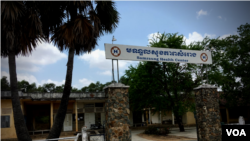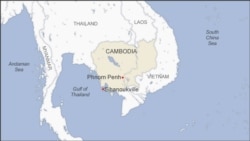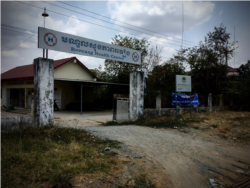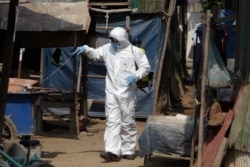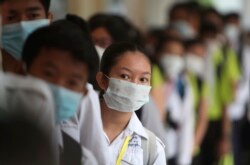The Samraung Health Center in the Bati district of Takeo province is tucked behind an Acleda Bank branch and opposite the local school.
Sitting alone in one of the rooms, Yeu Chhengly is busy on his phone. He runs the health center where to be tested for COVID-19, a person with symptoms must also have a travel history suggesting the likelihood of exposure to the highly contagious and potentially deadly virus believed to have originated in Wuhan, China, late last year.
This approach is being applied to the nearly 90,000 Cambodian migrant workers who have returned from Thailand, South Korea and Malaysia since March to celebrate the three-day Cambodian New Year that began April 14 or to avoid COVID-19 travel restrictions.
All of these workers were placed in isolation at home, with the Ministry of Health reporting that only 410 returnees were tested for the virus, all returning negative. Unlike many other countries, Cambodia has enough test kits to last until September, according to officials who anticipate availability will increase as global production ramps up.
Provincial travel by about 30,000 local garment workers is also being used to flag potential COVID-19 cases. The government canceled the annual Khmer New Year holidays in mid-April because of concerns garment workers from Phnom Penh would travel to the provinces, potentially spreading the virus.
This includes travel to hotspots like Sihanoukville, where 31 French tourists and two Cambodian tour guides tested positive for the novel coronavirus in late March.
Yeu Chhengly, the health center’s director, is eager to talk about the coronavirus pandemic. As of Monday, Cambodia had 122 confirmed cases and 119 recoveries. The government has recorded no deaths from the coronavirus, and it has been 15 days since a new case was reported.
He described 11 Cambodian migrant workers who had returned from Thailand to his commune and how eight of them had finished their 14-day quarantine period.
“We educate people that within 14 days if they have coughs, fevers or sore throats they should go to see a doctor, and we will report them to the health department,” Yeu Chhengly said.
Yeu Chhengly said the basic health screening, including temperature checks, were limited to those who had returned from abroad, or as the Ministry of Health puts it, “individuals with a recent travel history.”
District residents who had walked in over the past few weeks with coughs and other flulike symptoms, but with no recent travel history, were being treated as having “the normal flu,” Yeu Chhengly said.
“Some people are locals living here,” he said. “They cannot be infected because they are local, they just have the normal flu. We only report based on the patients’ [travel] history.”
Yeu Chhengly says that while it is hard to make an assessment of which cases were the flu and which were COVID-19, he emphasized to VOA Khmer reporters that these procedures were working effectively. Takeo province had no confirmed positive cases, he said.
His assertion ties in with the government’s narrative that cases in Cambodia have been linked to foreigners or citizens returning from overseas, which lets officials dismiss claims that there could be local clusters or community transmissions involving Cambodian citizens.
Worldwide, as countries contemplate emerging from lockdowns to restart their economies, experts see widespread testing for COVID-19 as a crucial steppingstone because knowing where the virus is spreading is key to relaxing social distancing and returning to a more normal life.
“I've mentioned many times the very important thing is testing, testing, testing,” the World Health Organization’s director in Cambodia, Dr. Ai Lilan, said April 13.
She praised Cambodia’s efforts in dealing with the 122 positive cases recorded so far but said Cambodia needed to create its own testing strategy.
The Cambodian Health Ministry has not been very clear about the country’s testing strategy.
On April 27, the Ministry of Health said it had conducted 11,576 tests since Cambodia’s first confirmed case was identified on January 27, with some 7,500 people having been tested so far.
In the seven-day period preceding April 27, Cambodia conducted 1,784 tests, officials said. Cambodia has the capacity to perform 600 tests a day in facilities at the Institute Pasteur du Cambodge and National Institute of Public Health.
Early on, the ministry believed that most cases in Cambodia were imported and tested only people with a history of travel outside the country, as well as those identified through contact tracing.
After a few recent cases emerged in Phnom Penh, Health Minister Mam Bunheng suggested that it was likely there was small-scale community transmission in the capital.
Even with provincial travel, only the 30,000 workers are being screened for COVID-19 symptoms, though movement between the provinces has resumed after the holidays.
Cambodia could soon have no confirmed, active cases, according to Health Ministry statistics, which could prompt the authorities to consider removing restrictions placed on businesses, educational activities and the general public.
However, there is skepticism over the government’s COVID-19 case tally and testing strategies, according to comments posted on social media.
Back in Takeo’s Bati district, Chea Sreng has roped off access to his office at the Roveang Health Center where he is the director.
Much like his colleague at the Samraung Health Center, Chea Sreng is focused on the Ministry of Health guidelines, saying it was unwise to diverge from them.
When people come to his health center with flulike symptoms, he recommends COVID-19 testing merely for those with travel histories. For now, he is focused on returning migrant workers.
If there is no recent travel history, he said, doctors will check for other respiratory diseases, like tuberculosis, but not for the novel coronavirus.
“Those who are without travel histories but are having such symptoms, they have the normal flu,” he said. “Only if migrant workers are having suspected symptoms should that, then, be tested.”




